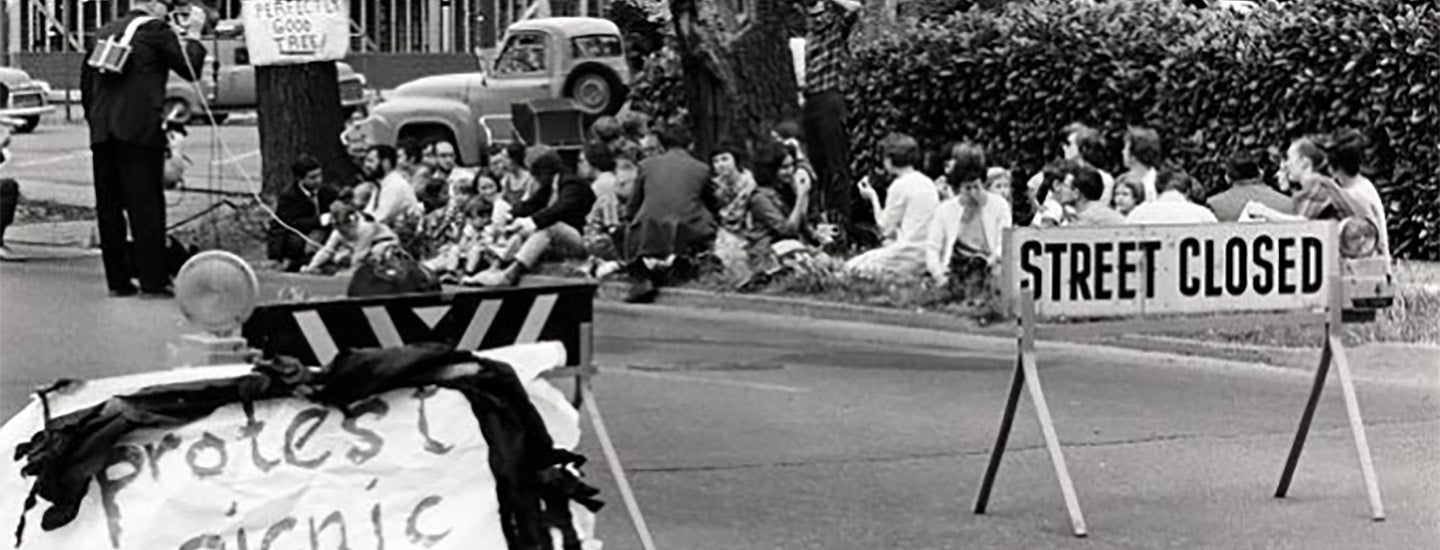
Frequently Asked Questions
Here are some frequently asked questions, adapted from Oregon State University’s Election Resources website and crowdsourced questions from EMU student employees. If you have a question that isn’t answered here, please email serve@uoregon.edu.
What is free speech (freedom of expression) at the University of Oregon?
Freedom of speech is a right granted by the U.S Constitution's First Amendment and Article 1 Section 8 of the Oregon State Constitution. Speech may be offensive or empowering, but regardless there is a constitutional obligation to protect it. At the University of Oregon, we share a duty to create a respectful environment for all, so keep this in mind when navigating sensitive issues and topics.
Student speech and expression needs to align with the Student Conduct Code.
What is the UO’s responsibility to protect free speech?
For purposes of the free speech clause of both the federal and state constitutions, the University of Oregon is “the government,” and so the institution is limited in its ability to restrict freedom of speech, even if the content is considered offensive or hateful. The university cannot prohibit speakers from coming to campus just because individuals from the campus or surrounding community disagree (or the UO disagrees) with the content of the speaker’s presentation or with their opinion.
This does not mean that the University of Oregon supports, endorses, or agrees with controversial speakers that come to our campus community. While the institution does not have the ability to limit or eliminate the presence of speakers that may be controversial, we acknowledge the difficulty and challenge this may pose for some students.
Students that wish to share their thoughts or concerns may meet with the Dean of Students by emailing uodos@uoregon.edu.
What is hate speech? Is it illegal?
Hate speech is any form of expression through which speakers intend to vilify, humiliate, or incite hatred against a group or a class of persons on the basis of race, religion, skin color sexual identity, gender identity, ethnicity, disability, or national origin1. The university condemns all hate speech and aims to create an environment that is supportive and safe for all students, faculty, and staff. That being said, in certain situations the university may be unable to give out consequences for this speech. Hate speech is protected under the First Amendment, and rulings have found that restricting hate speech would conflict with the First Amendment's protection of freedom of expression.
When speech becomes directed toward an individual with threats of harm, constitutes harassment, or disrupts university business, the university may be able to intervene. Students needing support in navigating instances of potentially unprotected hate speech can connect with the Office of the Dean of Students at uodos@uoregon.edu.
1“Hate Speech and Hate Crime.” Advocacy, Legislation & Issues, 8 Feb. 2023, www.ala.org/advocacy/intfreedom/hate.
What’s not protected free speech?
Free speech does not protect:
- Defamation (including libel and slander)
- Child pornography
- Perjury
- Forgery
- Blackmail
- Incitement to imminent lawless action
- True threats
- Solicitations to commit crimes
How does UO policy handle controversial speakers?
All speakers and demonstrations must adhere to the Time, Manner, and Place policies (link to these policies on the Guidelines page). This policy is in place to promote campus safety and prevent disruptions to university business. The university will likely not step in to cancel or restrict controversial speakers and events, unless there is a safety risk despite taking preventative safety measures.
I've noticed that there tend to be speakers/community members/protestors/demonstrators outside of the EMU Amphitheater by 13th Avenue. Are they allowed to be out there?
Yes, because 13th Avenue is a public road, and the UO is a public university, people (regardless of how controversial or our own opinions) are allowed to exercise their First Amendment rights. However, UOPD or UO administration may step in if speech goes beyond what is protected such as: defamation (including libel and slander), child pornography, perjury, forgery, blackmail, incitement to imminent lawless action, true threats, or olicitations to commit crimes.
Often, these groups are religious-based ministries and must book a space in the EMU. Due to their ability to reserve space, they are allowed to exercise their First Amendment right which covers free speech and freedom of religion. Again, unless they go beyond protected speech such as the above, they will be allowed in and around the EMU and campus.
Are they here often, and how long are they here?
Many speakers/protestors/demonstrators do not follow a schedule but are often here weekly in fall and spring terms. If they have booked a space, they will be in the space until their reservation time is up. If they are on 13th Avenue, they stay as long as they desire.
As a UO community member, should I engage and show that I disagree with the content of a speakers/community members/protestors/demonstrators' message?
As noted above, there are ways in which you as a community member can engage with these individuals should you choose to do so. It is important to be aware of the fact that while some of these individuals have a desire to engage in meaningful dialogue, some do not.
In some instances, the goal of some individuals is to unintentionally (or intentionally) create challenging or difficult circumstances which may serve to benefit them. This can often create distress and potentially harm for students, so it is important to be aware of this before making a choice to engage with a speaker/demonstrator that you may disagree with.
As a UO community member, how can I show that I disagree with the content of the message of speakers/community members/protestors/demonstrators?
There are many avenues to expressing your discontent with a speaker’s message. Counter speech is an excellent method of challenging hate speech and engaging without censoring the other parties. Some methods of this are:
- Ignore them and do not engage.
- Engage in dialogue with the group or speakers.
- Assemble, rally, or counter-protest to show different thoughts opposite of the message being shared.
